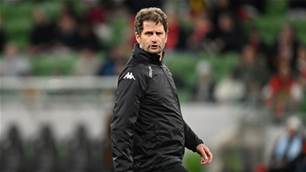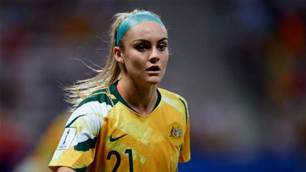Former Matilda, Kate Gill, believes the female international team is the only Australian side which could realistically win a World Cup or Olympic gold medal within the next 50 years.
The Matildas have made the past three World Cup quarter-finals and are currently ranked sixth in world rankings while the Socceroos come in at 54th.
Professional Footballers Australia (PFA) released its roadmap for women’s football last week with key recommendations in collaboration with FFA.
The plan emphasised increasing Australian female players' wages and club standards to ultimately produce better players for the national team.
Gill, PFA Player Relations Executive and Australia's all-time leading female goalscorer, believes the Matildas could realistically win an Olympic Gold Medal or World Cup.
And that, she said, would get the broad Australian public talking.
“The only real piece of silverware that’s missing from the Australian football landscape is a global trophy,” the former Matilda captain said.
“I think our women’s team are probably the only likely team I can see doing that within my lifetime and I think that would do wonders for the game.
“It will change the game in the way the game is viewed here and especially the way that our female footballers are treated.
“We’re adapting this model to increase the talent pool, give players the opportunity to become professionals and in turn that’s going to bring success in the Matildas.
“More girls being able to work their trade will mean they’ll be able to focus solely on football.”

After PFA unveiled its roadmap last week, a total of 12 W-League former and current club officials and coaches attended a meeting at Etihad Stadium to discuss the plan.
Gill said the feedback was positive but the research conducted by PFA revealed damning statistics regarding the W-League’s wages in comparison to female leagues in Europe.
According to the report, the W-League has the lowest minimum remuneration of any Australian sport including the new AFL women’s competition.
Gill believes the quality of women’s football has improved on the park year-by-year, and was not buying into the argument that the AFLW posed a threat.
“I think we offer players something totally different,” she said.
“To be able to play football at an international scale, go over play with different countries, clubs and play back home as well - it’s totally different.
"I can see the whole hype around the AFL and I take my hat off to them.
“I think they’ve done exceptionally well in the way they’ve marketed the girls and the way they’ve brought them to life. (But) football opens so many more doors than just being able to play one code in one country.”
Gill finished her playing career in 2015 and spoke about the welfare and responsibility of coaches, drawing from her own experiences.
“I know what it’s like, you have to juggle work, employment with football commitments,” she said.
“It takes a lot of determination and resilience just being almost like a unique superhuman kind of person. It is a time constraint and it can get a little bit daunting, lots of barriers to it especially coming from your personal relationships and your social life.
“I wouldn’t say I’ve sacrificed anything to be where I’m at, because I don’t consider it being a sacrifice but it is a tough gig to manage.”
PFA’s key recommendations:
- The ‘60 @ 60’ strategy - a collective bargaining agreement to provide the top 60 players in the league a minimum of $60,000 a year
- A PFA-developed National Women’s Football Network to fund flexible employment for players within the football industry
- FFA to distribute at least $175,000 a year to cover W-League player payments with clubs to generate $385,000 annually from aligned programs and properties
- Appointment of an advocate to promote greater distribution of revenues for teams and players participating in the FIFA Women’s World Cup
Related Articles

'Timing not right': Montemurro's verdict on Matildas vacancy

Matildas: 'Fourth at the Olympics is honestly the worst place you could come'
.jpg&h=172&w=306&c=1&s=1)













